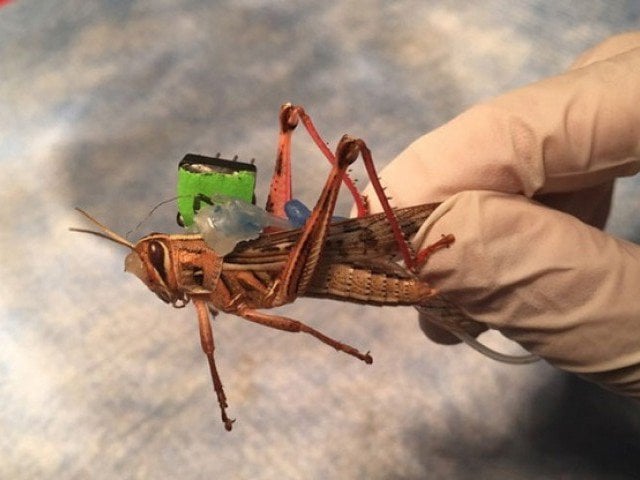
Meanwhile, concerns are raised by different quarters on the initiative, with many questioning the rationale behind the decision in the backdrop of the arrival of starlings, which mainly feed on locusts, in large numbers in the province. Some experts have also pointed towards the hazardous impact of pesticides on environment and the ecosystem.
Preparing to kill
Acknowledging that swarms of locusts had caused damage to standing crops on an extensive scale, which resulted in a loss to farmers and the provincial economy, Sindh Chief Minister Syed Murad Ali Shah directed agriculture department officials to hire some of the latest aircraft to spray insecticides in desert areas, during a meeting on Monday.
“The growers are quite upset [by locusts damaging crops] and I too feel sad at their loss,” he said.
He directed Sindh Agriculture Minister Muammad Ismail Rahoo to seek UAE’s assistance and request them to provide aircrafts for the purpose, stressing that measures in this regard needed to be taken at the earliest. “Otherwise they will cause irreparable damage,” he warned.
The CM said that the provincial government would release funds for hiring aircraft and procuring other items and equipment required for the spray.
Later, Rahoo confirmed while speaking to The Express Tribune that the provincial government planned to protect the region from locust attack in the upcoming summer season and was taking preparatory measures in this regard.
Over the last six months, agricultural lands in at least 15 districts have been afflicted by swarms of locusts. Of these districts, Ghotki, Sukkur, Khairpur, Sanghar, Umerkot and Tharparkar have suffered the most damage. Meanwhile, swarms of locusts also descended upon Nawabshah, Mirpurkhas, Badin, Thatta, Sujawal and Karachi.
Speaking in this regard, Rahoo said he was unable to estimate the extent of loss locusts had caused to farmers. However, surveys are being conducted in different areas to gauge the scale of the loss and if the need arose, some of the regions may be declared calamity-hit areas, he added.
Weighing options
Nevertheless, the negative impact of pesticides, sprayed for killing the locusts, on the environment cannot be played down.
Speaking to The Express Tribune, an environmentalist and a writer from Sanghar, Nawaz Khumbar said that it would not be wise to use pesticides to kill locusts, terming the step “dangerous for the environment.”
He recommended protecting birds that prey pests like locusts to naturally control them and also suggested the use of fishing nets for the purpose.
According to Khumbar, the use of aircraft for poisonous sprays will be more harmful for the flora and fauna than the locusts.
“Killing locust in haste will disturb the ecosystem,” said an official and an expert on birds and environment, who asked not to be named. In this case, it is rather recommended for the various departments of the government to coordinate and devise a scientific solution to end the problem, he added.
Another official from Umerkot, who too requested anonymity, shared that he had witnessed starlings consuming locusts in Umerkot recently, “which is a good sign for the agriculturists.” He said that “their crops will not be at risk of being attacked by locusts anymore.”
Deputy Secretary Agriculture Department, on the other hand, disagrees that starlings can be solely relied on to eradicate locusts.
“These birds can only help reduce their population to an extent but cannot completely eliminate the pests.”
Speaking in this regard, Rahoo said, “We understand that it [poisonous sprays] has hazardous effects [on the environment] but we don’t have any other option.” He, however, added that sprays will be used for killing locusts breeding in only desert areas and those prevailing in cropped regions, in order to scale down the impact of poisonous sprays on the environment. He assured that all factors would be considered and caution would be exercised during the course of the anti-locust drive.
According to Dayo, 70% of the locusts are breeding in desert areas and these need to be targeted first.
Lamenting lack of support
Meanwhile, Rahoo said that the federal government had committed to providing assistance for the eradication of locusts, by carrying out an aerial survey, helping with the hiring of aircraft and taking other measures, but it “hasn’t responded to the provincial government’s requests for assistance yet.”
Talking to The Express Tribune, he confirmed that the much needed [aerial] survey has not been conducted hitherto, ruing the Centre’s indifference. “The federal government has been indifferent to our request for assistance and we cannot abandon our people,” he said.
Dayo too is of the view that help from the federal government would help a great deal in managing the situation timely.
Earlier, in a meeting, Shah had apprised Rahoo that the Department of Plant Protection, a part of the Ministry of National Food Security and Research, has some aircrafts but they are grounded and hence cannot be employed for the eradication of locusts.
Published in The Express Tribune, January 7th, 2020.

1732883922-0/diddy-(48)1732883922-0-165x106.webp)

1732881115-0/disney-(1)1732881115-0-165x106.webp)

1732861143-0/Untitled-design-(73)1732861143-0-270x192.webp)











COMMENTS
Comments are moderated and generally will be posted if they are on-topic and not abusive.
For more information, please see our Comments FAQ